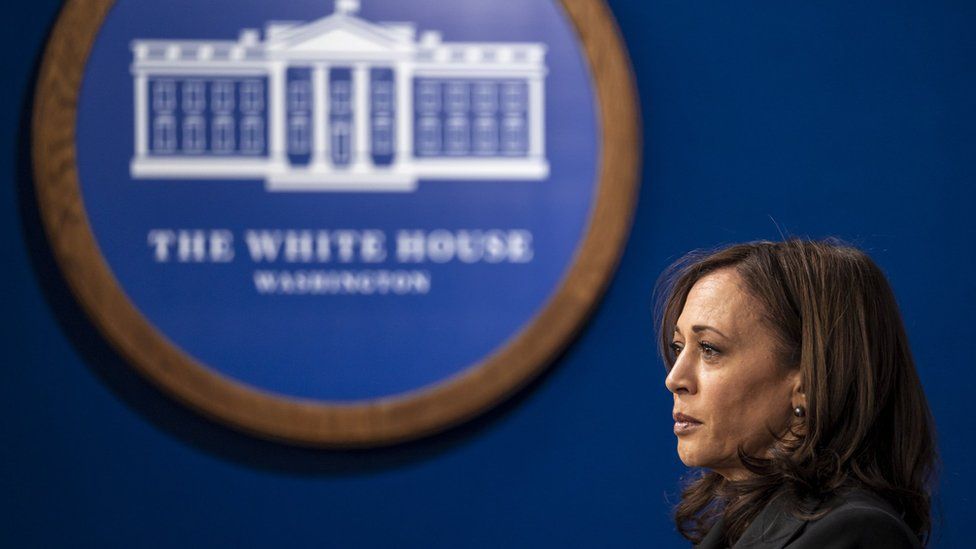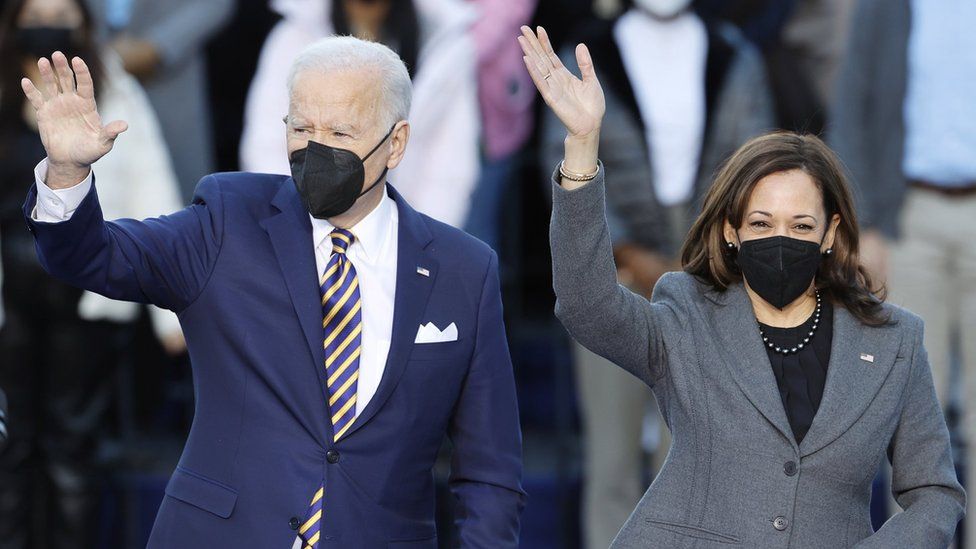Kamala Harris one year: Where did it go wrong for her?

But her first year as vice-president has been far from a smooth ride.
The job has not come easy. Ms Harris' approval ratings have slumped. The president has tasked her with assignments that range from the intractable to virtually insoluble. Her office has been beset by high-profile resignations.
If Ms Harris accepted her party's vice-presidential nomination thinking she would be anointed as the Democratic heir apparent to the presidency, it was a notion that did not take long to dispel.
While Mr Biden said in a press conference on Wednesday that he would keep her as his running mate if he stands for re-election, it remains to be seen whether that will put to rest speculation about her political future.
So what, exactly, has gone wrong for her - and can she set it right? There are no easy explanations and few easy answers.
A polling gut-punch
It was, without a doubt, an ugly poll. According to a November survey by USA Today, Ms Harris' public approval rating sat at 28%, making her one of the least popular vice-presidents in modern history - lower than Iraq War architect Dick Cheney, who was reviled by Democrats.
If there was one moment that truly set off the spate of "what's wrong with Kamala Harris" stories that dominated the latter half of 2021, it was that "comically bad" poll, as the San Francisco Chronicle put it. The poll effectively framed the conversation about the vice-president as one of struggle and disappointment.
Upon closer inspection, however, the survey appears more of an outlier. It looked particularly bad because 21% of respondents said they were undecided about Harris. Just over half of the poll respondents had a negative view of the vice-president, which is roughly on par with Mr Biden's negative ratings.
Subsequent surveys also showed her approval closer to Biden's - which fits with historical trends where vice-presidential approval tracks that of their president.
According to Cliff Young, president of US Public Affairs at the polling firm Ipsos, the forces pulling Ms Harris down are the same as those plaguing her boss - the Covid pandemic and the economy. If Mr Biden's approval rebounds because Americans feel like those problems are being addressed, Mr Young said, her popularity will improve as well.
He notes there is some silver lining for the vice-president. Most surveys place her at the head of the pack of prospective 2024 Democratic presidential nominees. She still appears to have political heft, at least among her own party - and among women and minority voters, in particular.
A tough portfolio
Since taking office, Ms Harris has been tasked with two high-profile assignments. The first is to address the root causes of undocumented migration into the US from Central American countries. The number of immigrants crossing into the US from the "Northern Triangle" of El Salvador, Guatemala and Honduras surged during the first year of the Biden presidency, and the administration was looking for ways to stem the flow while reversing some of the more draconian policies of the Trump administration.
The job as described was daunting, but manageable. Mr Biden served a similar role as vice-president in the Obama administration.
But some characterised her responsibilities to include the entirety of immigration and border security - a challenge decades in the making and one that, in all likelihood, will take decades to solve.
- Kamala Harris visits US border amid migrant crisis
- Harris tells Guatemala migrants: 'Do not come to US'
It is probably no coincidence that Ms Harris' descent into negative approval ratings began when the whole of the immigration issue was hung around her neck.
She has also been tasked with enacting national voting reform. Following Donald Trump's unsupported accusations of fraud in the 2020 presidential election, some Republican-controlled states have passed laws cutting back efforts to make voting easier, like voting by mail and ballot drop boxes. It became Ms Harris' job to shepherd national reforms that would pre-empt these state-level actions through Congress.
With unified Republican opposition and intransigence from some Democrats, however, the vice-president's efforts have been doomed to failure. The recent administration push on the subject is only making the futility of the effort more apparent - and being associated with futility is not a recipe for political success.
Mr Biden has set his vice-president up to fail, thinks journalist and vice-presidential historian Kate Andersen Brower.
"He's giving her assignments that are almost impossible," she said.
A big target
Vice-presidents are often viewed as political heirs to the presidents they serve, and such a conclusion is practically unavoidable when that president will be 82 at the end of his first term.

And Ms Harris clearly has presidential ambitions, having run for the office in 2019. When Mr Biden selected her as his vice-presidential nominee, she was frequently presented as the next generation of Democratic leader, with her multi-ethnic background and gender reflecting an increasingly diverse party.
- The other women in Kamala Harris' college photo
- The many identities of the first woman vice-president
Being at the head of the pack, however, has made Ms Harris an inviting target for political fire. Republicans, believing she is most likely to be their next opponent, are eager to put dents in her armour. Presidential rivals within her own party see her as the foremost obstacle in their path to the top prize.
"I think that there is extra special focus on Vice-President Harris right now, because of the uncertainty around Biden, and whether he's going to run again," said Mr Young. "I don't remember another time when we really focus so much on the vice-president and their polling numbers."
The vice-presidency is not without its advantages for those aspiring to the Oval Office - in name recognition and the ability to curry favour with party loyalists on a national scale - but those aspirations take place in full view of friends and foes alike.
Nagging doubts
Plenty of successful politicians have faced political hardship and survived.
The vice-president's supporters attribute much of the criticism to racism and sexism against Ms Harris - the burden carried by the historic nature of her ascent to office. They point to critics who write derisive columns on gender-tinged topics like her voice or laugh or purchase of expensive cookware.
At a recent event touting the administration's infrastructure law in Maryland, Margaret Hinds-English, president of a local government workers' union, spoke approvingly of Ms Harris. Seeing the vice-president gives hope that black women like her can succeed "if we put our minds to it".
Ms Hinds-English said she has ignored criticism of the vice-president. "Folks are going to say what they're going to say," she said.
But evidence that there is something wrong at the top is hard to dismiss.
Ms Harris' presidential campaign began with a bang. Her kick-off rally in January 2019 drew tens of thousands of supporters to Oakland, California. She rocketed to near the top of polls after performing strongly in the first primary debate later that June.
Then she came crashing back down to earth, beset by staff upheaval, underwhelming media interviews and subsequent debates, and no clear message or constituency in the party.
In other words, all the problems Ms Harris has faced during her first year as vice-president also surfaced during her presidential campaign.
She's had a surprising amount of staff turnover in her first year in office, with her communications chief and press spokesperson both departing.
A particularly stinging blow came in the Washington Post, where an anonymous former staffer said she was unwilling to do the work necessary for the job and took out her frustration on her aides.
"With Kamala you have to put up with a constant amount of soul-destroying criticism and also her own lack of confidence," the former staffer said. "So you're constantly sort of propping up a bully, and it's not really clear why."
Ms Harris' problems have regularly been compounded by gaffes during one-on-one interviews and public appearances. There's talk of friction between her office and the rest of the White House. She has been unable to settle on a policy issue that she can make a positive political calling card.
Politicians who survive hardship are usually the ones who learn from their mistakes and fix their shortcomings.
There are some indications that Ms Harris is doing so, as she has recently started spending more time at public events with Mr Biden, accepted more media interviews and hired a veteran communications operative. But the jury is still out on whether these steps will gain traction - and avoid turning her history-making ascent to the vice-presidency into a historical footnote.
<p>Chinese officials say they "firmly oppose" the platform being divested.</p>
TikTok ban now ‘inevitable’
Ukraine ‘will have a chance at victory’ with new US aid, Zelenskyy says
Israel Iran attack: Damage seen at air base in Isfahan
Who will be Trump’s VP? A shortlist
Ukraine war: Kyiv uses longer-range US missiles for first time
House passes potential TikTok ban that could speed through Senate
How soon could US ban TikTok after Congress approved bill?
Caught between Israel and Iran, Jordan clings desperately to stability
Taylor Swift broke Spotify record with new album
